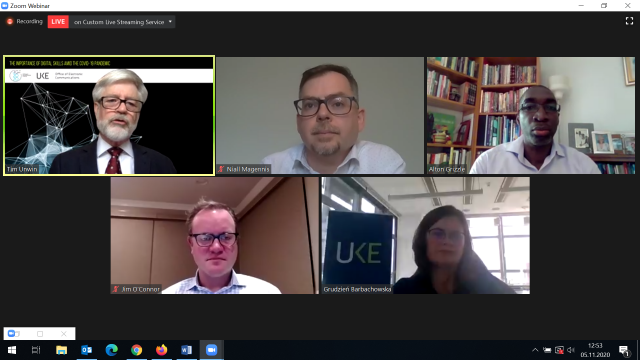Session
Office of Electronic Communications (UKE), Poland
As technologies continue to advance, digital skills become more prevalent. Furthermore, the development of digital skills accelerates due to the COVID-19 pandemic. Digital skills seem to be more relevant than ever before and should be considered as an important part of building resilience to economic and social disruptions. The COVID-19 havoc serves as a testing ground in various dimensions, including education and labour market. Bridging the digital gaps emerged as a key concern, as workers who do not have sufficient digital skills or access to high-speed internet are at risk of digital exclusion and, as a result, languish on the margins of society. Thus, digital inequalities lead to economic ones and affect the economies and societies. The pandemic has an impact on the importance of the prioritisation of digital skills and, simultaneously, the need of upskilling and reskilling for organisations, businesses and individuals. The new normal may be a trigger to revise or set up new strategies on strengthening digital skills, and prepare citizens for the digital future and ensure employability, competitiveness and participation in society. The aim of this multistakeholder discussion is to provide insights and practical examples of programmes and frameworks on digital skills strategies from around the world, to serve as manageable models or inspiration.
Moderator: prof. Tim Unwin, University of London
Speakers:
- Ms. Dorota Grudzień-Barbachowska, Director of the Department of Consumer Policy, the Office of Electronic Communications of Poland (UKE)
- Mr. Alton Grizzle, Programme Specialist, UNESCO
- Mr. Niall Magennis, Senior Director, GSM Association
- Mr. Jim O’Connor, Chairman and CEO, the United States Telecommunications Training Institute (USTTI)
We kindly invite you to join us!
Report
UKE activities undertaken to support consumers were presented. The Polish NRA has launched educational campaigns “I click sensibly”, “Coding with UKE” and “I know what I’m signing”. UKE has adjusted the ongoing undertakings to current social needs by hosting online courses, conferences and workshops for pupils, students, teachers and educators, as well as organizing online meetings with a consumer ombudsmen. Mr. Grizzle shared the basis of the Media Information Literacy (MIL) UNESCO concept, which is a supportive tool to overcome the consequences of pandemic. The MIL supports the development of digital competencies, through capacity-building resources, such as curricula development, policy guidelines and articulation, and assessment framework. Free and open online courses are available for self-paced learning. The MIL CLICKS social media initiative is part of UNESCO’s strategy to enable media and information literate societies. Mr. Nagennis introduced the GSMA perspective on getting people online via mobile broadband. The elements of the Mobile Internet Skills Training Toolkit were presented, as a GSMA tool to encourage and support people in improving digital skills by offering free online courses. The role of the government (regulators, policy-makers) in strengthening the development of digital skills was emphasized, including the concept of leaving no one behind.The USTTI approach was presented as a non-profit, US government-industry joint venture designed to deliver free of charge tuition. As Mr. O’Connor underlined, before the COVID-19, trainings were held onsite, to benefit fully from knowledge, experience sharing and networking opportunities. As the standard of today is online learning, USTTI is delivering circa 300 workshops around the world. These trainings are dedicated to the representatives of developing countries and the least developed ones. Mr. O’Connor indicated that assuring the connectivity, and preferably – meaningful one, has remained a challenge.
Final insights were shared by the moderator and speakers, as:
- Including the critical thinking skills into the work of the stakeholders,
- Building a sustainable strategy on digital skills tailored to post COVID-19 circumstances,
- Increasing role of policy makers, NRAs, ministries in charge of digital affairs and education in empowering societies with digital skills and assuring the effect of scale.
Moderator: prof. Tim Unwin, University of London
Speakers: Ms. Dorota Grudzień-Barbachowska, Director of the Department of Consumer Policy, the Office of Electronic Communications of Poland (UKE); Mr. Alton Grizzle, Programme Specialist, UNESCO; Mr. Niall Magennis, Senior Director, GSM Association; Mr. Jim O’Connor, Chairman and CEO, the United States Telecommunications Training Institute (USTTI)
